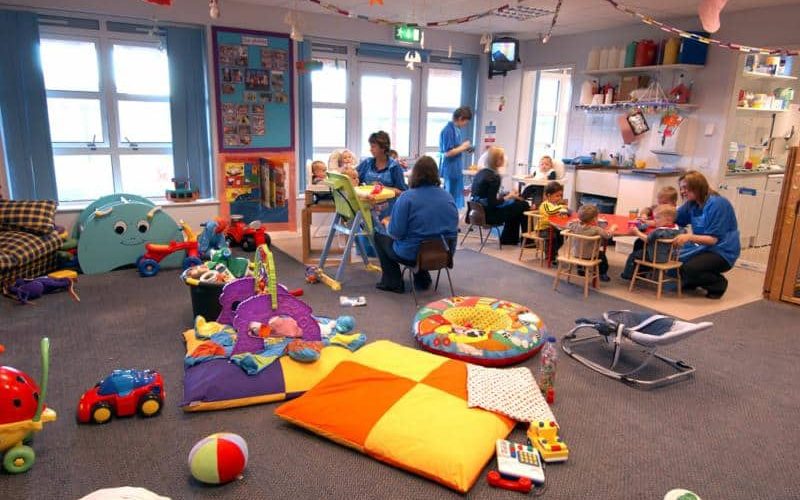Finding an option of child care is necessary for parents who have to work.
If it were possible to nurse a child during work hours, most parents would gladly jump at the option, but it is impossible as it would affect the overall performance of such a parent at work.
Being a stay home mom allows a mother to spend all the time in the world caring for her young but the effect staying at home would have on your bank account won’t be funny.
Although It is common knowledge that most times the option of one parent staying at home to take on childcare responsibility comes when the other parent has a job.
However, when both parents have hectic schedules, the next option is either a day care center or a private nanny.
Leaving your child under the care of someone else can be emotionally demanding. However, let’s look at the pros and cons of patronising a daycare center.
Pro: Cost
Compare to other child care services; a daycare center is more cost effective. Hiring a personal nanny for your child would mean spending more money and having to cancel or reschedule some of your plans when the nanny calls in sick.
But with a day care center, all you have to do is drop your kid off and go about the day’s movements.
Con: Your Childs safety is questionable
Daycare centers are usually not the safest place to drop a child because not all daycare centers run proper background checks on their staff before they employ them.
The risk of a child being abused by a caregiver in a daycare center is high, and a parent might not know because the kid would be unable to express his or her experience in words.
Playing with sharp objects and dangerous toys have led to quite some daycare injuries.
Because of the number of children in day care centers, proper monitoring during play hours is often tricky leading making it difficult to prevent some playground injuries.
Pro: Inspection and License
Before a daycare center is licensed, proper inspection of its environment, staff, and facilities is carried out by the appropriate body to ensure that children are well handled and safe.
Because it is possible to create an excellent first impression and change the setting of things after that, the inspecting body makes sure to run a routine check from time to time so that a high standard is maintained, or the system of operation is upgraded.
Con: Public holidays and sick days
Daycare centers do not open for business on public holidays and some other special days. Such breaks would mean that a parent has to look for another childcare option on those days.
In a situation where a parent is unable to find a nanny on such short notice, he or she may have to cancel their plans or reschedule.
When a child falls sick, daycare centers usually do not take them in so that the parents of such a child can give them the care and attention they require for recovery. While that is a good thing, it could also affect the plans of the child’s parents.
Pro: Creativity and growth of children
Daycare centers often make the children engage in healthy learning activities that would be beneficial to both their physical and mental growth.
Research has shown that these learning activities could aid speech development and other skills.
Children in daycare centers enjoy playing and learning with items that allow them to express and build their creativity.
Con: Sickness and diseases
Research shows that children in daycare centers are at a higher risk of contracting viral infections.
Sometimes, children with communicable diseases who seemingly look healthy are kept together with the healthy ones thus exposing them to germs.
Some of the common Illnesses contracted from daycare centers include cold, pink eye, hepatitis, and bacterial infections.
Pro: Mixing up
Children in daycare centers are never bored or lonely. The presence of many other kids makes room for socialising.
The infants learn new things together while they play and as these kids try to communicate with themselves, their speech becomes more apparent with time.
The parents of kids in daycare centers also get to socialise when they drop off their kids in the morning, and when they pick them up at closing time.
When these parents communicate, they can share ideas on childcare and other things.
Con: Lack of individual attention
It is almost impossible to get a daycare center that will offer one-on-one-care to your kid. Because of the population of children in daycare centers, one caregiver is usually assigned to a group of kids.
Depending on the kind of daycare center, one caregiver might have to take care of a group of three kids or a maximum of six kids.
However, for low-cost daycare centers, one caregiver might have to handle as many as twenty kids, or two caregivers could be assigned to the entire room of kids.
That explains why high-quality daycare centers record fewer injuries and cases of disease transmission amongst children than low-quality daycare centers.
However, because low-quality daycare centers are cheaper than high-quality daycare centers, parents who are low-income earners would instead patronise them and save money.
Pro: Immunisation
Because of the risk of contracting diseases, daycare centers make sure that children in their custody are given immunisation against infectious diseases frequently.
This would mean that children in such daycare centers are healthier than their counterparts.
Daycare centers also take it upon themselves to make sure that parents meet specific childcare requirements so that the kids are active and healthy both at home and outside.
Daycare centers are an excellent option of childcare for parents who are indeed of time away from their kids, so they can work.
But then, choosing the right daycare center for your infant vital if you want to be at peace while you are at work.
Sometimes, parents consider proximity and cost when they want to choose a daycare center for their kids, but the factors to be considered are not restricted to price and proximity.
Child safety should be the primary factor to be considered before any other element.










